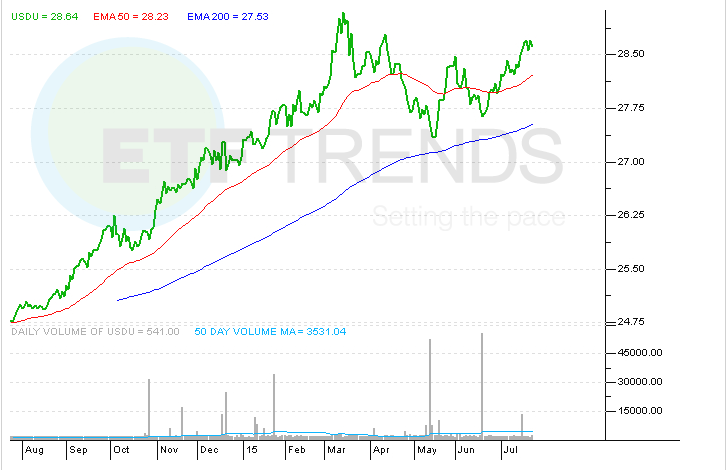An ETF to Cope With Tumbling Emerging Markets Currencies
It feels like the taper tantrum of 2013 all over again. Emerging markets currencies are getting severely punished with the WisdomTree Emerging Currency Strategy Fund (CEW) hitting an all-time low earlier today.
CEW, which tracks the U.S. dollar against the Mexican Peso, Brazilian Real, Chilean Peso, Colombian Peso, South African Rand, Polish Zloty, Russian Ruble, Turkish New Lira, Chinese Yuan, South Korean Won, Indonesian Rupiah, Indian Rupee, Malaysian Ringgit, Philippine Peso and Thai Baht, has slipped 14.2% over the past year.
“China’s economic slowdown is pushing down commodity prices, weighing on raw-material exporters from Brazil to Mexico and South Africa. Adding to the pain is the expectation that the Federal Reserve will soon embark on the first interest rate increase since 2006, threatening to lure capital away from developing nations,” reports Ye Xie for Bloomberg.
Fortunately, there is an ETF to help investors profit from tumbling emerging markets currencies: The WisdomTree Bloomberg U.S. Dollar Bullish Fund (USDU) .
USDU differs from its primary rival, the PowerShares DB U.S. Dollar Index Bullish Fund (UUP) , in at least one important regard. The WisdomTree offering is actively managed whereas UUP is the tracking ETF for the U.S. Dollar Index. The U.S. Dollar Index measures the dollar against only developed market currencies whereas USDU’s active management allows the ETF to track the dollar against developed and emerging markets currencies. [Why You Shouldn’t Bet on Weaker USD Currency, ETFs]
While the euro, yen and Canadian dollar combine for nearly 61% of USDU’s weight, the ETF also offers investors exposure to weakness in the Mexican peso (almost 10% of the fund) and the Brazilian real, among other emerging currencies. Alone, USDU’s dollar/peso and dollar/real positions are advantageous because, earlier today, the peso hit a record low against the greenback while the Brazilian currency labors at 12-year lows against the dollar. [Bad News for Brazil ETFs]
USDU also offers leverage to the weakening Australian dollar (6% of the ETF). The Aussie has been decimated by a series of Reserve Bank of Australia interest rate cuts and slumping commodities prices, among other factors. The latter makes short Aussie a trade on emerging markets weakness, of which there is plenty at the moment as highlighted by the CurrencyShares Australian Dollar Trust (FXA) hitting its lowest levels since 2009 today.
For its part, USDU is not far off its all-time high set in March and the ETF has jumped almost 15% since debuting in December 2013.
WisdomTree Bloomberg U.S. Dollar Bullish Fund

